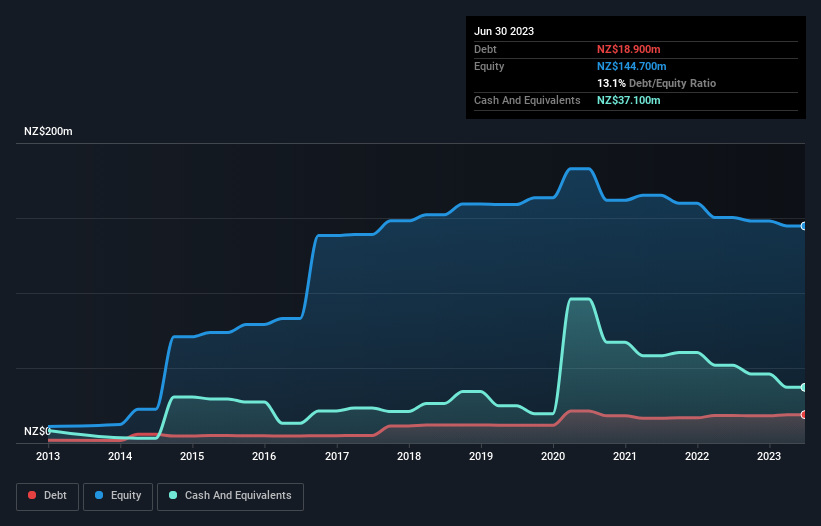Howard Marks put it nicely when he said that, rather than worrying about share price volatility, 'The possibility of permanent loss is the risk I worry about... and every practical investor I know worries about.' When we think about how risky a company is, we always like to look at its use of debt, since debt overload can lead to ruin. As with many other companies Vista Group International Limited (NZSE:VGL) makes use of debt. But the more important question is: how much risk is that debt creating?
Why Does Debt Bring Risk?
Debt and other liabilities become risky for a business when it cannot easily fulfill those obligations, either with free cash flow or by raising capital at an attractive price. If things get really bad, the lenders can take control of the business. While that is not too common, we often do see indebted companies permanently diluting shareholders because lenders force them to raise capital at a distressed price. Of course, plenty of companies use debt to fund growth, without any negative consequences. When we think about a company's use of debt, we first look at cash and debt together.
Check out our latest analysis for Vista Group International
What Is Vista Group International's Net Debt?
As you can see below, Vista Group International had NZ$18.9m of debt, at June 2023, which is about the same as the year before. You can click the chart for greater detail. But it also has NZ$37.1m in cash to offset that, meaning it has NZ$18.2m net cash.

How Healthy Is Vista Group International's Balance Sheet?
The latest balance sheet data shows that Vista Group International had liabilities of NZ$51.4m due within a year, and liabilities of NZ$30.9m falling due after that. Offsetting this, it had NZ$37.1m in cash and NZ$33.8m in receivables that were due within 12 months. So it has liabilities totalling NZ$11.4m more than its cash and near-term receivables, combined.
Since publicly traded Vista Group International shares are worth a total of NZ$373.3m, it seems unlikely that this level of liabilities would be a major threat. But there are sufficient liabilities that we would certainly recommend shareholders continue to monitor the balance sheet, going forward. While it does have liabilities worth noting, Vista Group International also has more cash than debt, so we're pretty confident it can manage its debt safely. When analysing debt levels, the balance sheet is the obvious place to start. But it is future earnings, more than anything, that will determine Vista Group International's ability to maintain a healthy balance sheet going forward. So if you're focused on the future you can check out this free report showing analyst profit forecasts.
In the last year Vista Group International wasn't profitable at an EBIT level, but managed to grow its revenue by 23%, to NZ$142m. Shareholders probably have their fingers crossed that it can grow its way to profits.
So How Risky Is Vista Group International?
By their very nature companies that are losing money are more risky than those with a long history of profitability. And in the last year Vista Group International had an earnings before interest and tax (EBIT) loss, truth be told. And over the same period it saw negative free cash outflow of NZ$8.4m and booked a NZ$12m accounting loss. With only NZ$18.2m on the balance sheet, it would appear that its going to need to raise capital again soon. With very solid revenue growth in the last year, Vista Group International may be on a path to profitability. By investing before those profits, shareholders take on more risk in the hope of bigger rewards. The balance sheet is clearly the area to focus on when you are analysing debt. But ultimately, every company can contain risks that exist outside of the balance sheet. For example, we've discovered 1 warning sign for Vista Group International that you should be aware of before investing here.
If you're interested in investing in businesses that can grow profits without the burden of debt, then check out this free list of growing businesses that have net cash on the balance sheet.
New: Manage All Your Stock Portfolios in One Place
We've created the ultimate portfolio companion for stock investors, and it's free.
• Connect an unlimited number of Portfolios and see your total in one currency
• Be alerted to new Warning Signs or Risks via email or mobile
• Track the Fair Value of your stocks
Have feedback on this article? Concerned about the content? Get in touch with us directly. Alternatively, email editorial-team (at) simplywallst.com.
This article by Simply Wall St is general in nature. We provide commentary based on historical data and analyst forecasts only using an unbiased methodology and our articles are not intended to be financial advice. It does not constitute a recommendation to buy or sell any stock, and does not take account of your objectives, or your financial situation. We aim to bring you long-term focused analysis driven by fundamental data. Note that our analysis may not factor in the latest price-sensitive company announcements or qualitative material. Simply Wall St has no position in any stocks mentioned.
About NZSE:VGL
Vista Group International
Provides software and data analytics solutions to the film industry.
Excellent balance sheet with reasonable growth potential.
Market Insights
Community Narratives


Recently Updated Narratives

Constellation Energy Dividends and Growth

CoreWeave's Revenue Expected to Rocket 77.88% in 5-Year Forecast

Bisalloy Steel Group will shine with a projected profit margin increase of 12.8%
Popular Narratives


MicroVision will explode future revenue by 380.37% with a vision towards success


NVDA: Expanding AI Demand Will Drive Major Data Center Investments Through 2026



